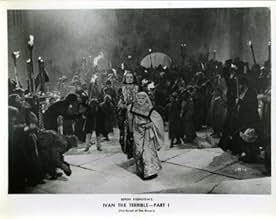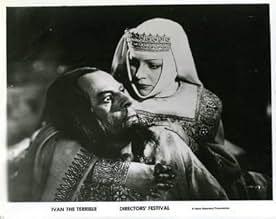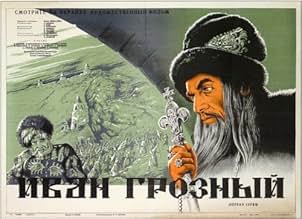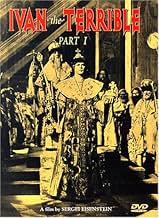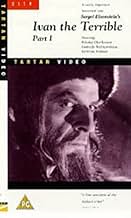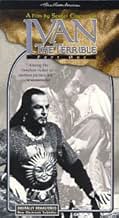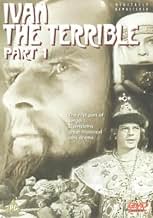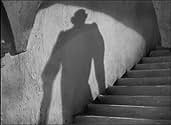IMDb-BEWERTUNG
7,7/10
11.361
IHRE BEWERTUNG
Füge eine Handlung in deiner Sprache hinzuDuring the early part of his reign, Ivan the Terrible faces betrayal from the aristocracy and even his closest friends as he seeks to unite the Russian people.During the early part of his reign, Ivan the Terrible faces betrayal from the aristocracy and even his closest friends as he seeks to unite the Russian people.During the early part of his reign, Ivan the Terrible faces betrayal from the aristocracy and even his closest friends as he seeks to unite the Russian people.
- Regie
- Drehbuch
- Hauptbesetzung
- Auszeichnungen
- 2 Gewinne & 1 Nominierung insgesamt
Aleksandr Rumnev
- The Stranger
- (as Aleksandr Rumnyov)
Empfohlene Bewertungen
On a backdrop of intrigue, murder and betrayal, Prince Ivan conquers enemies and becomes the first Czar of all Russia, at the cost of his own soul.
Eisenstein's name and reputation loom over film history in such a forbidding way that you would be forgiven for deeming his work impenetrable by modern standards, yet while his silent epics are so seminal as to be hard to evaluate objectively, his late talking films can be hugely rewarding viewing, even to more casual film-goers. As a summation of his artistic evolution and scholarship, they are no less treasurable or significant than Battleship Potemkin, yet they have a more compelling story to tell.
Ivan The Terrible was to be a trilogy, of which only parts 1 and 2 were completed before their creator fell into disfavor with Stalin. Yet parts 1 and 2 are rich enough that together they form a perfect story ending on a chilling note. On to part 1 then...
Part 1 tells the story of Prince Ivan from young hopeful to warlord and recluse, before he truly accepts his calling. It is an incredibly romanticized tale, and formally, a relic of a time long gone, one that perhaps only ever existed in Eisenstein's mind. His was a unique visual sensibility and the Ivan films are full of layered, meticulously composed and designed shots: characters scurry like rodents through claustrophobic tunnels, the look is at times so expressionistic as to evoke where The Cabinet of Dr Caligari might have evolved. It is both familiar and horribly alien, like the nightmare it later confirms itself as in part 2.
Given the conflicting emotions evoked - heroism with oppression, epic scale but suffocating formalism - you would do well to brace yourself through this one and remember that only once you've seen both parts will it all make terrible sense. Only then will you appreciate the unique genius at work here.
One cannot distinguish between the two Ivans for one cannot exist without the other, and together, they form one of the best films ever made.
Eisenstein's name and reputation loom over film history in such a forbidding way that you would be forgiven for deeming his work impenetrable by modern standards, yet while his silent epics are so seminal as to be hard to evaluate objectively, his late talking films can be hugely rewarding viewing, even to more casual film-goers. As a summation of his artistic evolution and scholarship, they are no less treasurable or significant than Battleship Potemkin, yet they have a more compelling story to tell.
Ivan The Terrible was to be a trilogy, of which only parts 1 and 2 were completed before their creator fell into disfavor with Stalin. Yet parts 1 and 2 are rich enough that together they form a perfect story ending on a chilling note. On to part 1 then...
Part 1 tells the story of Prince Ivan from young hopeful to warlord and recluse, before he truly accepts his calling. It is an incredibly romanticized tale, and formally, a relic of a time long gone, one that perhaps only ever existed in Eisenstein's mind. His was a unique visual sensibility and the Ivan films are full of layered, meticulously composed and designed shots: characters scurry like rodents through claustrophobic tunnels, the look is at times so expressionistic as to evoke where The Cabinet of Dr Caligari might have evolved. It is both familiar and horribly alien, like the nightmare it later confirms itself as in part 2.
Given the conflicting emotions evoked - heroism with oppression, epic scale but suffocating formalism - you would do well to brace yourself through this one and remember that only once you've seen both parts will it all make terrible sense. Only then will you appreciate the unique genius at work here.
One cannot distinguish between the two Ivans for one cannot exist without the other, and together, they form one of the best films ever made.
I have two comments to make about some disparaging remarks made by other contributors: First, it is naive to condemn this film as "propaganda" -- GONE WITH THE WIND is all propaganda about how great the Old South was and how great the Ku Klux Klan was. LAWRENCE OF ARABIA is propaganda about how heroic and clever the English were and how corrupt the Turks were. DR STRANGELOVE is all propaganda, too. THE ALAMO and other John Wayne films are propaganda about how great the conquest of the West was, how heroic the ethnic cleansing against the Indians was, and how corrupt the Mexicans were. So spare me your hypocritical condemnation of this film as "Stalinist Propaganda".
Secondly, what definitions can there be for whether a film is "great" or not? I suggest the use of two criteria: (A) Is viewing the film multiple times worthwhile and interesting? (B) Does viewing the film represent a memorable life experience? With these criteria, it does not matter whether the film is "dated" or the acting is "overdone" or whether the sound is flawed or in this or that quality. I certainly find IVAN THE TERRIBLE more interesting the more times I view it. On the other hand, there are movies that I consider "great" even though I refuse to watch them ever again, because I found them unbearably sad -- recent examples are SCHINDLER'S LIST and MILLION DOLLAR BABY.
Secondly, what definitions can there be for whether a film is "great" or not? I suggest the use of two criteria: (A) Is viewing the film multiple times worthwhile and interesting? (B) Does viewing the film represent a memorable life experience? With these criteria, it does not matter whether the film is "dated" or the acting is "overdone" or whether the sound is flawed or in this or that quality. I certainly find IVAN THE TERRIBLE more interesting the more times I view it. On the other hand, there are movies that I consider "great" even though I refuse to watch them ever again, because I found them unbearably sad -- recent examples are SCHINDLER'S LIST and MILLION DOLLAR BABY.
I've seen this a number of times now so it's difficult for me to remember having trouble getting into the stylised form of acting and by 1944 dated expressionistic cinematography that other viewers might have. First time of watching it was on UK TV over 20 years ago with Part 2 and a documentary called Part 3 containing the remaining extant scenes, and I loved it. I'm dead against arty farty pretentious movies and am always aware that being obscure does not automatically make a film a classic, but this really is a classic of its kind. It was Eisenstein's best work (imho) a rallying call to all of the disparate inhabitants of Mother Russia to work and fight together, which was ordered by Stalin and who was pleased with the similarities I bet he was on tenterhooks waiting for Ivan to go insane though.
Ivan is crowned Tsar of all the Russias and proceeds to drag the country into the 16th century, disposing of external enemies in the form of Tartars, starting a long war against Livonia and limiting the influence of the antagonistic aristocracy, the boyars. The acting is intensely melodramatic, with endless sinister sidelong glances taken from acute camera angles and Ivan's pointy beard shown to good advantage, which to people not paying much attention can probably be mirth-inducing. But this was pulse-quickening propaganda for the new Russian working class to comprehend, not Artheads decades later - Eisenstein did it so memorably that like Potemkin it's still spellbinding today. Otoh he borrowed extensively from Snow White too for some of most incredible shadowy images in here, and his whole technique hadn't moved on from silent film. The use of the b&w nitrate film, costumes, sets and angular ugly faces are wondrous to behold and Prokofiev's stirring music glues it all together triumphantly.
All in all, a knockout film with faults but which still defies and will survive all criticism.
Ivan is crowned Tsar of all the Russias and proceeds to drag the country into the 16th century, disposing of external enemies in the form of Tartars, starting a long war against Livonia and limiting the influence of the antagonistic aristocracy, the boyars. The acting is intensely melodramatic, with endless sinister sidelong glances taken from acute camera angles and Ivan's pointy beard shown to good advantage, which to people not paying much attention can probably be mirth-inducing. But this was pulse-quickening propaganda for the new Russian working class to comprehend, not Artheads decades later - Eisenstein did it so memorably that like Potemkin it's still spellbinding today. Otoh he borrowed extensively from Snow White too for some of most incredible shadowy images in here, and his whole technique hadn't moved on from silent film. The use of the b&w nitrate film, costumes, sets and angular ugly faces are wondrous to behold and Prokofiev's stirring music glues it all together triumphantly.
All in all, a knockout film with faults but which still defies and will survive all criticism.
Perhaps if I had not watched von Sternberg's SCARLET EMPRESS the day before I watched IVAN THE TERRIBLE, I would have appreciated Eisenstein's film more.
SCARLET EMPRESS is von Sternberg's own historical Russian epic: Catherine the Great (played by Marlene Deitrich) rises to power despite conspiracies against her--conspiracies much like the ones that face Ivan in Eisenstein's film. The films are remarkably similar, and Eisenstein's influence on von Sternberg's lighting and montage sequences could not be more apparent.
Unfortunately, IVAN THE TERRIBLE is light years behind SCARLET EMPRESS in terms of the integration of sound with image, humanistic characterizations, and nuanced (as opposed to exaggeratedly theatrical) acting styles. If I had to guess, I'd say IVAN THE TERRIBLE was made ten years before SCARLET EMPRESS. In fact, it was made ten years after.
I'm a big fan of Eisenstein's BATTLESHIP POTEMPKIN, and as a student of Russian history and culture, I expected IVAN THE TERRIBLE to be a thoroughly engaging film. Instead it seemed a primitive effort: a move backward for a man who excelled at silent storytelling but couldn't evolve along with cinema. Of course, this IS Eisenstein, and IVAN is a very intelligent and well-crafted film, but viewed alongside its contemporaries, its shortcomings become all too apparent.
SCARLET EMPRESS is von Sternberg's own historical Russian epic: Catherine the Great (played by Marlene Deitrich) rises to power despite conspiracies against her--conspiracies much like the ones that face Ivan in Eisenstein's film. The films are remarkably similar, and Eisenstein's influence on von Sternberg's lighting and montage sequences could not be more apparent.
Unfortunately, IVAN THE TERRIBLE is light years behind SCARLET EMPRESS in terms of the integration of sound with image, humanistic characterizations, and nuanced (as opposed to exaggeratedly theatrical) acting styles. If I had to guess, I'd say IVAN THE TERRIBLE was made ten years before SCARLET EMPRESS. In fact, it was made ten years after.
I'm a big fan of Eisenstein's BATTLESHIP POTEMPKIN, and as a student of Russian history and culture, I expected IVAN THE TERRIBLE to be a thoroughly engaging film. Instead it seemed a primitive effort: a move backward for a man who excelled at silent storytelling but couldn't evolve along with cinema. Of course, this IS Eisenstein, and IVAN is a very intelligent and well-crafted film, but viewed alongside its contemporaries, its shortcomings become all too apparent.
This first part of Eisenstein's filming of the life and times of "Ivan the Terrible" has lots of drama, very good characterizations, fascinating settings, and plenty of action. Nikolai Cherkasov is completely convincing in the lead role, and the rest of the cast complements him well (especially Serafima Birman as his crafty aunt). This period in history is quite interesting and significant in itself, and Eisenstein presents everything in a fashion that is thoughtful and also enjoyable to watch.
Ivan combined a remorseless personal ambition with a genuine desire to strengthen and protect Russia, while the boyars, who opposed him, acted from motives that were almost exclusively personal. Combined with the plans of Russia's neighbors, all of this makes for a complex and interesting series of events, and the movie does a good job of presenting both the events and the possibilities, both on the surface and behind the scenes. Not the least of the reasons why it works so well are the settings. They are always interesting, believable, and atmospheric - and the indoor settings are especially so.
Part One is praiseworthy both in its own right and as the foundation for the outstanding sequel. Eisenstein generally excelled at depicting important periods in his country's history, and his series on Ivan's critical reign demonstrates all of his many skills. His attention to detail (of which there are too many examples even to try to list) and his appreciation for the overall picture make this a memorable film of high quality.
Ivan combined a remorseless personal ambition with a genuine desire to strengthen and protect Russia, while the boyars, who opposed him, acted from motives that were almost exclusively personal. Combined with the plans of Russia's neighbors, all of this makes for a complex and interesting series of events, and the movie does a good job of presenting both the events and the possibilities, both on the surface and behind the scenes. Not the least of the reasons why it works so well are the settings. They are always interesting, believable, and atmospheric - and the indoor settings are especially so.
Part One is praiseworthy both in its own right and as the foundation for the outstanding sequel. Eisenstein generally excelled at depicting important periods in his country's history, and his series on Ivan's critical reign demonstrates all of his many skills. His attention to detail (of which there are too many examples even to try to list) and his appreciation for the overall picture make this a memorable film of high quality.
Wusstest du schon
- WissenswertesTook over 3 years to make.
- PatzerAfter Anastasia's death, when discussing the Livonian war the "only" son of the Czar is mentioned. However at the time Ivan had two sons, Feodor, who became Czar Feodor I of Russia, and also Tsarevich Ivan Ivanovich.
- Zitate
Czar Ivan IV: Those who tore down the bells without Czar's permission, those by Czar's command get torn down the heads for not too long.
- Crazy CreditsAll the credits are showed in front of a fire smoke.
- VerbindungenEdited into Geschichte(n) des Kinos: Une histoire seule (1989)
Top-Auswahl
Melde dich zum Bewerten an und greife auf die Watchlist für personalisierte Empfehlungen zu.
Details
Box Office
- Weltweiter Bruttoertrag
- 12.196 $
- Laufzeit1 Stunde 43 Minuten
- Farbe
- Sound-Mix
- Seitenverhältnis
- 1.37 : 1
Zu dieser Seite beitragen
Bearbeitung vorschlagen oder fehlenden Inhalt hinzufügen



